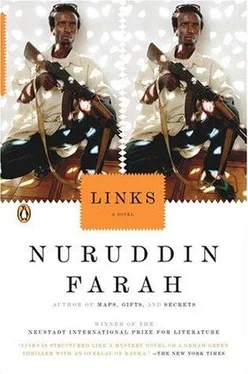“Are the warlords subservient to business cartels?”
“As long as they are from the same blood community. Fact: The warlords and the business community stand to profit from every skirmish, every confrontation. Fact: Most fighting takes place outside business hours, in the late afternoon, when the markets have closed for the day, or very early in the morning, before they have reopened, or at night. I would say that the so-called markets have something to do with much of the fighting, but you can’t divide business and blood so easily in this country.”
“It doesn’t look that way from the outside!”
“Of course it doesn’t.”
Jeebleh murmured to himself: Warlords, market forces!
With subliminal grief on his face, Bile continued, “Some people, as a matter of fact, trace the falling-out of StrongmanSouth and StrongmanNorth to the arrival of billions’ worth of Somali banknotes flown in from England, where they had been printed for the former dictator’s regime. All hell broke loose when the plane bringing the banknotes in from Nairobi was diverted to an airstrip in the north of the city.”
“By StrongmanNorth?” Jeebleh asked.
“The excessive greed of both strongmen produced fragmentation, then a civil war,” Bile said. He stopped suddenly and turned to Jeebleh: “Here we are!”
“Where’s here ?”
“The Refuge.”
THE GATE SLUMPED ON ITS HINGES, CREAKING FORWARD, ITS BOTTOM EDGE almost touching the ground, its paint flaking off. Jeebleh assumed that it was seldom closed, and imagined children and abused women walking in, the children to be looked after and fed, and the abused women to receive comfort and professional counseling. You didn’t need to close such a gate.
As he and Bile passed through, Jeebleh saw a number of bungalows. There was a sign saying “HOYI”—shelter — in prominent capitals, and a smaller one announcing “The Refuge.” “In days now long gone,” Bile explained, “when schools ran morning, afternoon, and evening sessions, most of these bungalows served as dormitories. Day students of several secondary schools in the neighborhood, whose parents lived in other towns, used to stay here.”
They walked past a low-ceilinged cottage where youths in dark overalls were gathered around a broken-down vehicle, being instructed in motor repair. As they walked farther, the din grew louder, and younger too. A bell rang, and twenty or thirty teenagers, most of them boys, came pouring out. Jeebleh and Bile stood aside. A door behind them opened, and more boys and girls, younger than the previous group, came out, running with the uninhibited enthusiasm of youth. The girls were giggly, the boys full of chase. They seemed so much younger than the armed youths at the airport, or the runners at the hotel.
An elderly woman greeted Bile by name, and then acknowledged Jeebleh’s presence with a nod. Jeebleh learned that she was in charge of the children, with the help of several younger women. To one side, a man was bending down to tie the shoelaces of a very small girl.
Peace reigned here, Jeebleh thought. Bile had created several overlapping worlds, ideally conceived: the flat he shared with Seamus; The Refuge; the clinic, which Jeebleh had yet to see; and Raasta and Makka’s world too, temporarily interrupted as that might be. These worlds were contrasted starkly with what one might experience in the rest of the city. They were oases of comfort in a land of sorrow.
Bile pushed open a door to the anteroom of an office. On the wall were photographs of children, some in school uniform, some not. For a moment, Jeebleh was lost in reverie, forgetting where he was. He stared at images of boys and girls receiving awards from an Italian monsignor. There were captioned photographs of a swimmer receiving a medal, a chess player who had finished second at a competition in Prague, a runner who had been second fastest in a steeplechase competition.
“Did you choose this place?” Jeebleh asked.
“Do you recall what it used to be?”
“I remember we used to call it ‘The Dormer.’ When we were in our teens, it was a dormitory run by the Roman Catholic Church. It was a home to abandoned children, who were looked after by the fathers. And before that, it belonged to a Sicilian who had named it Villa San Giovanni.”
“Well done!” Bile said.
“Now tell me more about it.”
As it happened, Bile had walked into the building by chance one day, a few months into the civil war. He was on some errand or other, and for some reason took a detour. Maybe a mysterious force had led him here. He came upon a child in a corner, wrapped in a blanket and smartly dressed in pants and a handsome T-shirt with writing in Gothic script. The presence of the girl in an empty dormitory made no sense, and there was no way of knowing who had left her there. When he returned home with a girl for whom he had no name, Shanta and Faahiye, with whom Bile shared the house then, decided on one for her, because she kept pointing to herself and saying something close to “Marta,” or was it “Marcia”? They called her Makka, and sure enough, she responded to it.
They fell silent as a young man entered the office without knocking. He brought them tea on a tray. Bile nodded a thank you and waited until they were alone to speak further. “In another sense, you could say that Raasta brought us all here.”
“How’s that?”
“Or rather, I should say that Raasta brought her mother here, as a prelude to her being born. And then guess what? Dajaal met Shanta here, again by chance.”
“I won’t ask what Dajaal was doing here either.”
“He was in charge of the force holding the district.”
“Go back to Shanta, or how Raasta brought her here.”
“It’s all fascinating and complicated,” Bile said, and paused. “Shanta was very pregnant with Raasta, eight months or so. She had gone to an appointment with an obstetrician, but because of the fierce fighting between the clan militia and the Tyrant’s forces, the doctor wasn’t there. Shanta had walked a great distance, all the way from Digfar hospital. The fighting between the clan militiamen and the regime was very fierce, bombs were falling everywhere. But at no time, Shanta would tell me later, did she fear for her own life or her baby’s.”
A handheld radio on Bile’s desk came to life, and the static in the room made him silent. They listened as two women talked about provisions for The Refuge, which one of them was supposed to obtain.
When they signed off, Bile continued: “It was probably Shanta’s weighty bladder that brought her here. She was in need of a toilet, tired, so she found a bed and fell asleep. Sometime later, after it had gotten dark, Dajaal, who was in command of the group fighting against the Tyrant’s forces in the district, woke her up. He went to get her husband, who helped find a midwife. Then Dajaal led me to her, in time to deliver Raasta into the world. So we’re all connected to this place!”
DINNER AT THE REFUGE PROVED TO BE AN EYE-OPENER.
Jeebleh had to sit on a mat on the floor. If he needed a reminder that he was physically out of shape, then here it was, drilling pain into his knees, his upper thighs, even his heels. He could not tuck his feet under his body, as the others all managed to do with ease. Even though he ached terribly, he remained in a crouch, and kept changing position. Finally he squatted, balancing himself on the tips of his toes.
“Who are these children, and why them?” he asked.
“In the main, there are periods when there is little or no fighting, and periods when the strife is more intense,” Bile replied. “The bulk of the children, those who form the core group, we refer to as ‘inmates.’ A third of the children you see qualify as ‘tourists’—they’ve fled the fighting in their villages, but they plan to go back when the fighting dies down.”
Читать дальше












